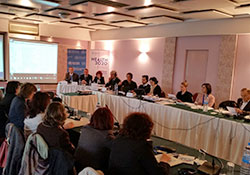First national training workshop on water-related diseases in the former Yugoslav Republic of Macedonia

Institute for Public Health
In cooperation with the national institute for public health, WHO/Europe held the workshop on 9–10 March 2016, to strengthen the country's surveillance of water-related diseases and improve national professionals' knowledge of and skills in effective surveillance approaches and in the detection, epidemiological investigation and control of waterborne outbreaks. The programme included:
- reviewing water-related diseases and the current outbreak surveillance system in the country;
- discussing the objectives, core functions and requirements of surveillance systems and the main approaches to the surveillance of water-related diseases; and
- reviewing key principles and elements of effective outbreak management and methods and tools for the epidemiological investigation of outbreaks, including practical exercises based on case studies.
About 50 participants attended, including hygiene, environmental health, epidemiology and other health professionals from the national institute of public health and regional public health centres, and representatives of the State Sanitary and Health Inspectorate, the Food and Veterinary Agency and the Ministry of Environment and Physical Planning.
Recommendations to strengthen surveillance of water-related diseases
Participants discussed the key challenges and actions to improve the country's surveillance and response systems for outbreaks of water-related disease. They recommended follow-up action, including:
- making incident reviews and/or developing case studies of outbreaks in the country;
- establishing a dedicated team to coordinate activities related to managing outbreaks, and an information system to ensure effective communication and coordination between national and local authorities; and
- building capacity in risk communication and providing further hands-on training on the epidemiological investigation of outbreaks.
The former Yugoslav Republic of Macedonia is taking steps to promote and implement the Protocol on Water and Health: the major pan-European policy instrument on water, sanitation and health. The Protocol's core requirements include establishing and maintaining comprehensive national and local surveillance and early-warning systems for water-related disease, contingency plans and response capacities; these were also discussed during the workshop.
The workshop was closely linked with the country's national strategy for health until 2020 and its action plan for health and environment, which are in the process of being endorsed by the Government. The event was organized as part of the biennial collaborative agreement between WHO/Europe and the Ministry of Health.



